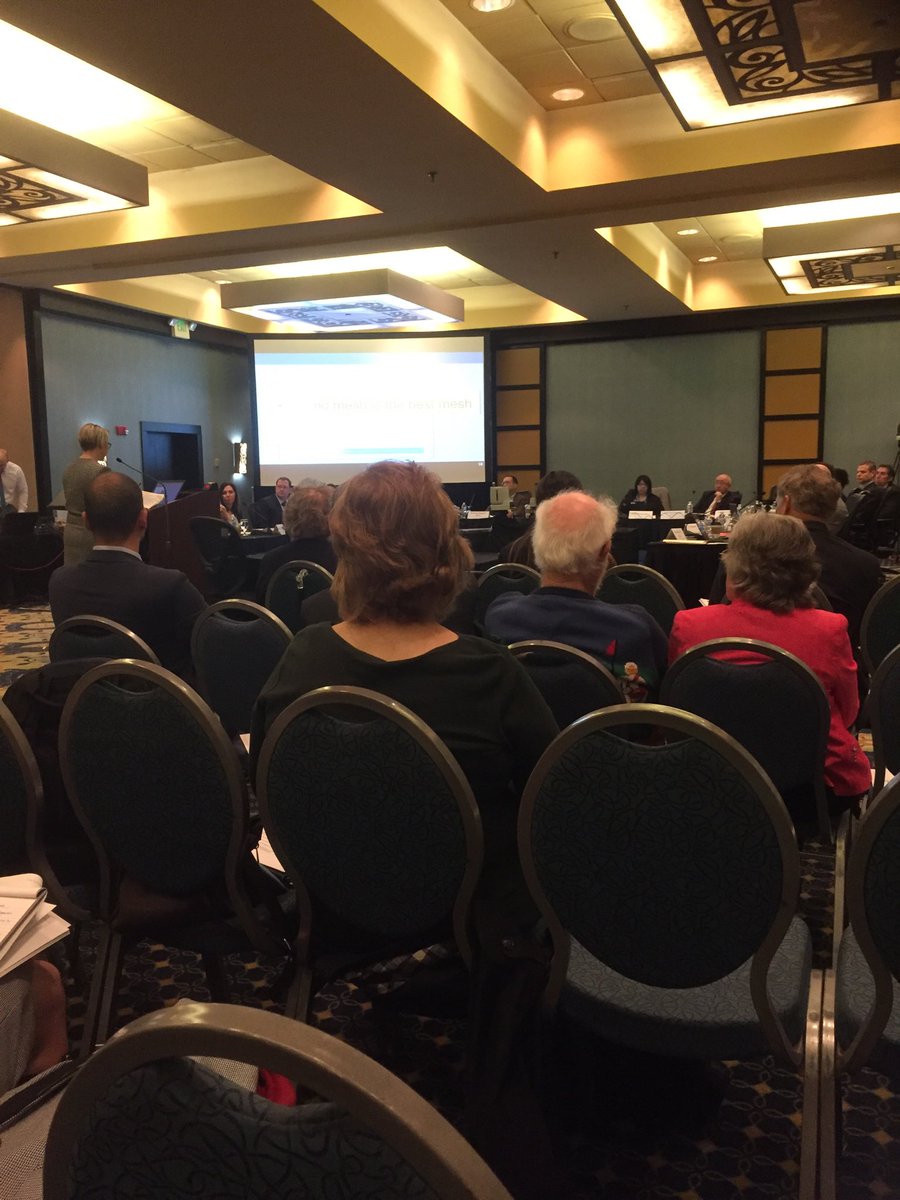Today’s FDA hearing on the safety of vaginal mesh is underway. I’m here covering the event for @ICIJorg 

The hearing will include testimony from patients, doctors, industry reps, lawyers and more. It is considering the use of surgical mesh for repair of pelvic organ prolapse (POP) - there are three POP mesh products that remain on the US market
Hearing begins w statements from the public. First speaker is Kila Baldwin, attorney who won $41 million verdict against Johnson & Johnson. She says there is "no good sound evidence" supporting mesh safety & that it should be taken off the market
Dr Charles Nager, chair of ObGyn at UC San Diego Health, presents study comparing outcomes of prolapse patients w hysterectomy vs vaginal mesh. Found no statistically significant difference betw the two procedures' outcomes after 3 years, said mesh should remain an option
In response to Q from panel, attorney Baldwin says meshes currently on the market are larger pore & lighter weight than the ones in her past cases. But says based on current clients, the inflammatory response & risk of retraction and deformation is the same
“There are times I take pain medicine, turn the light off and lay there and cry” - patient Barbara Lynn Melling describes terrible pain that mesh caused during sex.
FDA data expert @DeviceEvents testifies that mesh manufacturers used summary reports to report patient harm, which compress many incidents in a single report that is often not disclosed to public. She found one summary report w more than 1000 incidents.
(To clarify, @DeviceEvents is an expert on FDA data, but no longer works for the FDA)
“Millions of women will experience pelvic organ prolapse in the coming years. They deserve treatment options” - Sherrie Palm, director of prolapse support group, urges panel to "consider the voices of the silent majority” whose mesh implants are successful
FDA presentation has now begun. In discussion of regulatory history, FDA notes that other countries have taken stronger action on mesh - Australia's TGA has removed transvaginal POP mesh from the market & the UK and Ireland have suspended its use
“Adverse events associated with these devices are not rare,” FDA says. It has received more than 11,000 reports of patient harm associated w mesh, with the most common problems being pain, erosion and infection
FDA literature review finds mesh performs worse on safety than native tissue repair at all timepoints, w greater risk of reoperation. On effectiveness, lit shows mesh better than NTR for measured, objective outcomes but no different on subjective outcomes (satisfaction)
“Favorable benefit/risk really needs to be established long term.” FDA's Dr. Angie Lee tells expert panel that 1-year outcomes or other short term data is not enough to determine that mesh is safe or effective
Dr. Ronald Morton of Boston Scientific presents company's postmarket studies of its mesh devices Uphold Lite and Xenform. Finds both w slightly higher success rates in treating prolapse after 3 years than alternative treatment. Patient quality of life & complications about same
There's a bit more testimony to go, but FDA, companies and patients have all presented. Next step: FDA expert panel decides whether to recommend the approval of Boston Scientific and Coloplast's applications for PMA approval of their mesh devices.
Then, considering the panel's recommendation, FDA makes its decision. If applications are approved, the devices can stay on the market. If FDA says no, it means that mesh to treat prolapse is effectively banned in the US
I'll have a writeup soon on the key takeaways from today's vaginal mesh hearing. And ICIJ will be keeping a close eye on mesh and other controversial medical devices going forward #ImplantFiles
Here's our story on the hearing
icij.org/investigations…
Any thoughts, feedback and tips on where we should investigate further are more than welcome! #ImplantFiles
icij.org/investigations…
Any thoughts, feedback and tips on where we should investigate further are more than welcome! #ImplantFiles
• • •
Missing some Tweet in this thread? You can try to
force a refresh






